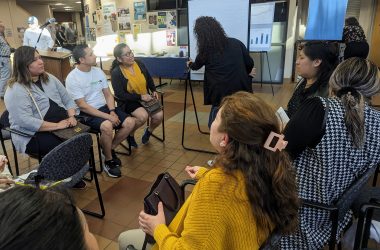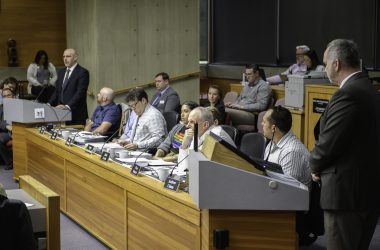Throughout Salem, in front of grocery stores and at popular events, people with clipboards have been collecting signatures in an attempt to bring the issue of a Salem payroll tax to a public vote.
As of Tuesday morning, July 25, the campaign has gathered over 4,000 unverified signatures, according to Oregon Business and Industry, the group leading the effort. The group needs to submit at least 3,986 qualified signatures for registered voters within the city of Salem to get the issue on the ballot in November.
The signatures have not yet been validated, and the group is seeking at least 6,000 total signatures to account for errors, before the submission deadline to the City Recorder on August 9, who would then review the sheets and file it with the County Elections Division.
The rapid collection of signees is a result of around $25,000 in campaign spending on advertising, mailers and paid signature gatherers, OBI confirmed Tuesday, in addition to volunteers who printed the petition at home or posted it on social media.
“I have never seen a grassroots campaign like this one before, and I’ve been working in and around politics for 20 years now, more than 20 years now,” said Angela Wilhelms, president of Oregon Business and Industry.
“We’re really excited. We still have a lot of work to do,” she said.
Preston Mann, the group’s political affairs director, filed the petition on July 14, and it was approved for circulation that day.
The Salem City Council approved the payroll tax in a 5-4 vote after a lengthy meeting on July 10, which followed several months of deliberation in the city’s budget committee.
The council’s decision would put the tax to a public vote no later than 2031, after seven years of tax collection.
The tax will bring in an estimated $27.9 million per year through a 0.814% tax on worker paychecks for all work done within Salem. That’s about $42 per month for a Salem worker earning the city’s average wage of $29.90 an hour.
People who make minimum wage are exempt, and retirement or pension income is not subject to the tax. Someone who makes $15 an hour full-time will be taxed an estimated $21.16 a month, or $253.97 per year, according to the online payroll tax calculator from the city.
In May, City Manager Keith Stahley told Salem Reporter that a payroll tax was selected because it would meet the revenue need for the city, and would not require going to the voters every five years like a levy would. The tax also broadens who is getting taxed beyond property owners, by including people who work in Salem but live outside city limits.
Salem’s payroll tax differs from those imposed in Eugene and Portland, which tax based on the employer’s physical address. Wilhelm said that they heard from employers who had questions about how to implement it in Salem, which plans to tax hours worked within Salem regardless of employer location.
“It really wasn’t a lot of clarity about the applicability of the tax or where the revenue would be spent. Community safety was pretty broadly defined. Administrative costs are able to come out of the tax revenue and there was no specificity as to what those would be. And the applicability question is a really big one,” Wilhelm said.
The payroll tax seeks to address a citywide budget deficit threatening to drain general funds. The major goals for the payroll tax include sustaining and expanding police and fire departments, and keep the doors open on the city’s homeless services currently funded by one-time federal and state Covid grants.
Mayor Chris Hoy, who voted in favor of the tax, told Salem Reporter last week that he believes the funds will curb violent crime, improve emergency response time and help make headway on the homelessness crisis.
“We are elected to use our judgment to make decisions in the best interest of the community. And that is exactly what I did. A failure to impose this tax would mean a complete decimation of city services. That is unacceptable to me and to our community,” Hoy said.
Wilhem said OBI is singularly focused on gathering signatures, and policy changes are up to the city council.
“This (petition) is not about the city of Salem’s ability to address critical public safety issues. This is about a vague and expensive tax that was enacted on the narrowest of margins and without a vote of the people, and that is what we’re focused on, right now,” Wilhelm said. “We have no issue with a local jurisdiction asking its voters if they support raising money for specific purposes.”
Community responses
Conservative and business advocacy groups have organized to gather signatures to put the tax on the ballot. Those include the Marion County Republican Party Timber Unity and the Oregon Small Business Association.
The campaign finance records for the filing show only a $20 contribution to the Refer the Tax on Salem Workers campaign as of Tuesday. The political action committee is funding the Let Salem Vote! site which links to the petition. Oregon law requires that transactions, like contributions and expenses, are filed within 7 days, and Mann estimated that about $25,000 of transactions have not been posted by the system yet.
Representatives of the Northgate Neighborhood Association also tabled at Northgate Park last week during its Fun Friday event, gathering signatures.
Though turnout during public meetings has been largely dominated by those opposed to the tax, the council’s decision is seeing some community support, including from some neighborhood association leaders.
“I do not support a public vote because that would obviously and surely fail,” said Geoffrey James, land use chair at the Morningside Neighborhood Association, in an email to Salem Reporter.
“This need is urgent, and we cannot wait a year for a sales campaign to possibly educate and persuade the public that city services, like adequate police, fire, parks, library, senior center, and homeless services all need to be funded,” he said. Others in his neighborhood association concurred.
The Salem City Council met again Monday night, and received information about the petition, though councilors and city staff did not make any additional comments on the subject.

Below, a small group gathered in the main courtyard of City Hall to hold a rally over the tax. Clifford Eiffler-Rodriguez planned the rally the day before, and announced it on social media. He also testified against the tax at the July 10 council meeting
Eiffler-Rodriguez previously settled an excessive force lawsuit against the city of Salem and three police officers, alleging officers shot him with crowd control munitions and then tackled and wrongfully arrested him during a 2021 protest outside Planned Parenthood near the North Lancaster neighborhood.
He said he wanted to gather to talk with people about the payroll tax, separately from the business advocacy groups. As someone who works in Canby but lives in Salem, he won’t be subject to the tax.
Eiffler-Rodriguez said he supports the funding for the homeless Navigation Center and homeless services, but wants to see leaner response models at the police and fire departments.
He would also like to see funding for a crisis response team, which would send mental health experts and social workers rather than police to respond to people in mental health crisis.
“I grew up here. I’ve moved back here twice. I believe that we can have a good city,” he said. “It was a tough decision for (the council) to make to institute the tax. I think it’s a tougher decision to send it to the voters, to trust us, right? Trust the voters to make the decision… we did it last year with the bond,” he said, referring to the infrastructure bond Salem voters overwhelmingly approved in 2022.
Seven people in total came to the small rally on the steps, and an eighth passerby sat down to listen. When Eiffler-Rodriguez, on a microphone, criticized councilors’ statements that they couldn’t commit time to campaign on the issue, the newcomer interjected to say that the councilors are volunteers who work full time.
After some back and forth with those gathered, she asked them what they would cut before she got up to leave.
It was Lois Stark, a member of the Salem Public Library Advisory board. She came across the rally unexpectedly, on the way out of the city council meeting which she attended to support an agenda item about approving new library board members.
“I think the city council made a very, very hard decision,” she told Salem Reporter. “I understand that there’s questions about the large amount that we spend on police and fire,” and she has questions about the increases herself.
A major concern for Stark is the library, which she worries could see cuts if the city cannot secure additional revenue, as councilors have stated.
“We just got the full hours back after Covid. And if you go to the library, there are tons of people. People that are unsheltered, gay, queer, transgender youth. It’s a place for anybody. And I worry about where they’d make the cuts,” she said. “It’s not easy. It’s just not an easy decision.”
Contact reporter Abbey McDonald: [email protected] or 503-704-0355.
SUPPORT OUR WORK – We depend on subscribers for resources to report on Salem with care and depth, fairness and accuracy. Subscribe today to get our daily newsletters and more. Click I want to subscribe!
Abbey McDonald joined the Salem Reporter in 2022. She previously worked as the business reporter at The Astorian, where she covered labor issues, health care and social services. A University of Oregon grad, she has also reported for the Malheur Enterprise, The News-Review and Willamette Week.









